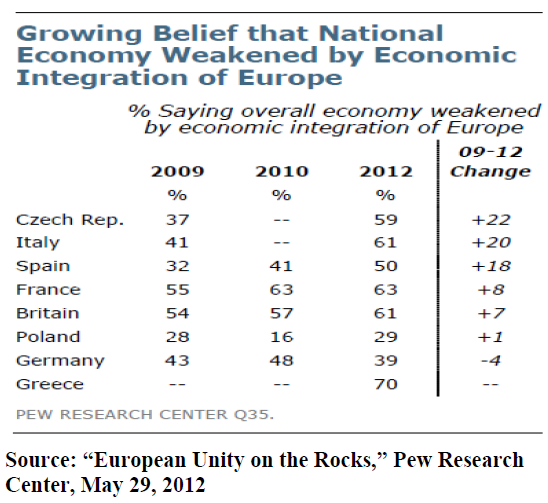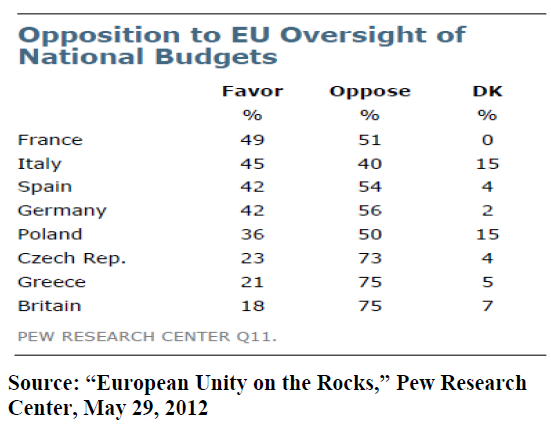There is a widely-held view among the leaders of Europe’s traditional mainstream parties and the global business and financial elite that the debt and growth crisis can only be solved by a more integrated European Union (EU). This would include, among other things, granting the EU the power to oversee and control national budgets, the creation of euro bonds or some other form of debt mutualization and an EU-wide banking deposit guarantee. These elites also broadly feel that the deteriorating economic environment will eventually convince most citizens of the EU countries to opt for a much closer political and economic union.
In this report, we argue that this line of thinking is increasingly at odds with the sceptical and even hostile perception a significant percentage of the European electorate has towards the euro zone and the EU, and that this is one of the greatest obstacles standing in the way of a positive resolution of the European debt crisis. Some of the indicators include: 1) the weakening of the traditional mainstream pro-EU political parties in favour of far right and left parties which oppose bailouts and further European integration; and 2) increasingly negative public attitudes towards the EU and euro zone in general.
The growing opinion that integration is not the solution, but the problem
In stark contrast to most elites who advocate a more tightly integrated EU and euro zone as the only rational solution to the debt crisis, an increasing number of Europeans are convinced that economic and political integration are not the solution, but the ultimate cause of the economic hardship inflicting much of Europe.
A majority of people in many countries are also against further oversight by the European Union.
The population of The Netherlands is turning away from the EU and euro zone
A recent poll found that 64% of the Dutch were against moving towards a political union and transferring more power to the EU.Furthermore, an upcoming general election scheduled for Sept. 12 looks set to further weaken the Netherlands’ traditional pro-EU parties. On the far-right is the Freedom Party, which was responsible for the collapse of the government last April, while on the far-left is the Socialist Party. Both are united by their anti-bailout views. Recent polls show that the Socialists could win the most seats.It is also predicted that no party will win more than one-fifth of seats, which means the outcome could be a very unstable coalition beholden to one of the two extremist parties. This would weaken the ability of the Netherlands to pass further bailouts and/or legislation ceding sovereignty to the EU and euro zone.
Anti-EU sentiment sweeps into UK’s political mainstream
Unlike in other countries where anti-EU sentiment first found a home in far right or left parties, anti-EU sentiment originated in the governing Conservative Party. One hundred of its lawmakers (out of 306) are currently demanding that a referendum be held on the future of UK membership in the EU.As for the general public, close to 50% want the UK to leave the EU. Prime Minister David Cameron recently said “I don’t think Britain is happy with its current relationship with the EU.”
This growing anti-EU feeling combined with the fact the UK has entered its second recession in four years has hurt the popularity of its government. Only 27% of Britons found that the Prime Minister was doing a good job, down 10% in only one month.Further, the Conservatives are running 10% behind the opposition Labour Party in the polls.The next election is officially scheduled for March 2015, but given that the Conservatives are in a coalition government with Liberal Democrats, an earlier election date cannot be ruled out.
To Read the Entire Report Please Click on the pdf File Below.
- English (UK)
- English (India)
- English (Canada)
- English (Australia)
- English (South Africa)
- English (Philippines)
- English (Nigeria)
- Deutsch
- Español (España)
- Español (México)
- Français
- Italiano
- Nederlands
- Português (Portugal)
- Polski
- Português (Brasil)
- Русский
- Türkçe
- العربية
- Ελληνικά
- Svenska
- Suomi
- עברית
- 日本語
- 한국어
- 简体中文
- 繁體中文
- Bahasa Indonesia
- Bahasa Melayu
- ไทย
- Tiếng Việt
- हिंदी
Can The European Elite Save Europe From The Europeans?
Published 08/08/2012, 01:06 AM
Updated 05/14/2017, 06:45 AM
Can The European Elite Save Europe From The Europeans?
Latest comments
Loading next article…
Install Our App
Risk Disclosure: Trading in financial instruments and/or cryptocurrencies involves high risks including the risk of losing some, or all, of your investment amount, and may not be suitable for all investors. Prices of cryptocurrencies are extremely volatile and may be affected by external factors such as financial, regulatory or political events. Trading on margin increases the financial risks.
Before deciding to trade in financial instrument or cryptocurrencies you should be fully informed of the risks and costs associated with trading the financial markets, carefully consider your investment objectives, level of experience, and risk appetite, and seek professional advice where needed.
Fusion Media would like to remind you that the data contained in this website is not necessarily real-time nor accurate. The data and prices on the website are not necessarily provided by any market or exchange, but may be provided by market makers, and so prices may not be accurate and may differ from the actual price at any given market, meaning prices are indicative and not appropriate for trading purposes. Fusion Media and any provider of the data contained in this website will not accept liability for any loss or damage as a result of your trading, or your reliance on the information contained within this website.
It is prohibited to use, store, reproduce, display, modify, transmit or distribute the data contained in this website without the explicit prior written permission of Fusion Media and/or the data provider. All intellectual property rights are reserved by the providers and/or the exchange providing the data contained in this website.
Fusion Media may be compensated by the advertisers that appear on the website, based on your interaction with the advertisements or advertisers.
Before deciding to trade in financial instrument or cryptocurrencies you should be fully informed of the risks and costs associated with trading the financial markets, carefully consider your investment objectives, level of experience, and risk appetite, and seek professional advice where needed.
Fusion Media would like to remind you that the data contained in this website is not necessarily real-time nor accurate. The data and prices on the website are not necessarily provided by any market or exchange, but may be provided by market makers, and so prices may not be accurate and may differ from the actual price at any given market, meaning prices are indicative and not appropriate for trading purposes. Fusion Media and any provider of the data contained in this website will not accept liability for any loss or damage as a result of your trading, or your reliance on the information contained within this website.
It is prohibited to use, store, reproduce, display, modify, transmit or distribute the data contained in this website without the explicit prior written permission of Fusion Media and/or the data provider. All intellectual property rights are reserved by the providers and/or the exchange providing the data contained in this website.
Fusion Media may be compensated by the advertisers that appear on the website, based on your interaction with the advertisements or advertisers.
© 2007-2024 - Fusion Media Limited. All Rights Reserved.
